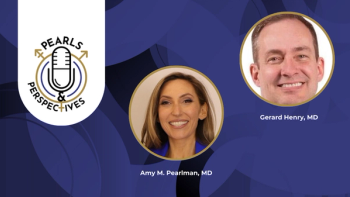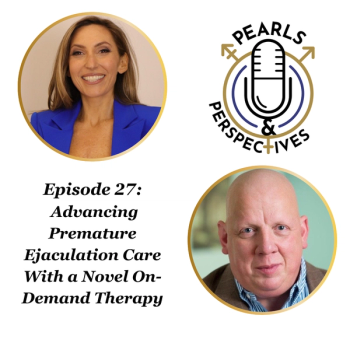
Expert explains long-term testosterone therapy in men with hypogonadism
A recent study, co-authored by Karim Sultan Haider, MD, explored the long-term effects of testosterone therapy on erectile function and mortality in hypogonadal men and men with diabetes.
Men with type 2 diabetes often suffer from erectile dysfunction at higher rates and severities than those without. Additionally, they are less responsive to PDE5 inhibitors, which is why they are mainly treated with long-term testosterone therapy (TTh).
A recent study, co-authored by Karim Sultan Haider, MD, investigated the long-term effects of TTh on erectile function and mortality in hypogonadal men and men with diabetes.1 The updated results of this study were presented at the 2021 Sexual Medicine Society of North America Fall Scientific Meeting. Sultan Haider is an andrology and urology resident at Gesundheit Nord, Bremen, Germany.
Please discuss the background for this study.
The study was initiated in 2004, when testosterone undecanoate injections came on the market as a long-acting depot. My father got the idea that he should study the long-term effects of this drug and he started off with measuring blood parameters, doing urological exams, and so on. After a couple of months, he started getting referrals from an orthopedic clinic and from a dermatological office because patients seem to have autoimmune diseases that are related to testosterone deficiency. He started also giving these patients testosterone injections as a long-acting depot and he started measuring all kinds of exams. What we are presenting at SMSNA are the long-term results in regard to erectile function, as well as quality of life, weight reduction, and some of the mortality data that we accumulated of hypogonadal men who are also diabetic. All of the patients in this subgroup analysis were hypogonadal men with type 2 diabetes, and the data collected in this area was a collaboration between the urological office of my father as well as the Diabetes Center in our small German town.
What were some of the notable findings from this study? Were any of them surprising to you or your co-authors?
When we take a look at the erectile function data that we gathered, we can see what is also clear in most other studies. It's that during the first couple of months, there is an improvement in erectile function in hypogonadal men receiving testosterone as well as deterioration that is [the physiological way in the untreated man.] However, when we look at the full graph, we can see that even after 12 years of treatment, there is still slight improvement in erectile function in the treated men. And most importantly, the improvement that they were able to get during the first couple of years is sustained, whereas what we expected in untreated men is that their erectile function keeps on deteriorating. After 12 years, we have a difference in between both groups of 25 points in the erectile function index, which is the difference between no erectile dysfunction and severe dysfunction.
How do these findings build on previous research regarding testosterone therapy in this cohort of men?
As I had mentioned, there are some other studies that take a look at erectile function in hypogonadal men receiving testosterone therapy. All of these studies, be it a randomized, placebo-controlled study or other registered studies, have about 2 years, maximum 3 years, observation time, whereas our study keeps on for more than 15 years of observing. Therefore, we don't have the highest standard as in placebo-controlled, randomized-controlled trials, but what we have is a long-term observation. It is a registry study that has been going on for more than the last decade and is still ongoing and also still recruiting.
What is the significance of these findings for providers and for patients?
Taking a look at the significance, we can see that all of the improvement we saw in our registry study, be it in between each year as well as in in regard to the baseline, were statistically significant. Therefore, we could encourage all of the prescribers, all of the physicians and clinicians, to take a look at testosterone therapy not as the “black sheep” in between treatment options, but as a normal treatment option. Men who are hypogonadal, have low testosterone, and are asymptomatic need some kind of treatment because it also has effects other than on their erectile function. If we take a look at mortality, we can see that during our observation time, we had only 10 cases of death in the treated men, whereas we had more than 70 cases of deaths from myocardial infarction, stroke, or other causes that were related to low testosterone or hypogonadism. So, having the patients in a physiological testosterone range could be of benefit to all of the hypothetical patients.
Based on these findings, are you likely to alter your own clinical practice in any way? Why or why not?
After a couple of years into our study, we started not only publishing these results, but also encouraging our colleagues and even other physicians of other specialties to take a look at testosterone values. We started collaborating with orthopedics, we started collaborating with dermatologists, and the latest collaboration was working with the Diabetes Center. All of those collaborations are measuring testosterone levels and looking into hypogonadism in patients who are receiving treatment, but not improving the way they should be under the regular treatment. So, our way has been altered by encouraging our direct colleagues to start looking into testosterone levels and to refer to us or to have patients refer to them if we think that they can also benefit from an orthopedic treatment or dermatologist looking at the issues.
What is the take-home message for the practicing urologist?
If a patient comes into the office and he presents symptoms of hypogonadism, check the testosterone level and then re-check his testosterone after a couple of days. If he is hypogonadal and he has symptoms, then give him the option to get testosterone therapy. Start collaborating with other specialties because, as I had mentioned, testosterone deficiency, or hypogonadism, is not only a urological issue, not only an endocrinological issue, but it's a full-body disease. It needs to be looked at from all angles and the patient should get the best treatment they can.
Is there anything else you feel our audience should know about the findings?
Our study is one of the longest running studies with, right now, more than 16 years of follow-up. We can only encourage everyone to take a look at their hypogonadal patients receiving testosterone. Not only checking what most would check, the testosterone levels, but also taking a look at other measurements like blood pressure and blood levels for all kinds of parameters, like liver and fat parameters, in order to examine the cardiovascular risk profile. Also, to check for glucose levels as well as HBA1C to make sure that these patients are not also diabetic and need treatment in that area. So, always look at the patient as a whole and not only their testosterone levels.
What are some of the key other key studies being presented at SMSNA that our audience should be aware of?
There have been a lot of presentations regarding penile prosthetic implants. I think this is what this year was mainly about. Most of the abstracts I had looked through were in that area and there had been some interesting publications in that regard. One of the most interesting things that was presented, I think, is the options that are provided right now in contrast to options that were provided, say 20 years ago, when AMS started with prosthetics.
References
1. Saad F, Haider A, Haider KS, et al. Long-term Testosterone Therapy Improves Erectile Function and Reduces Mortality in Men with Hypogonadism and Type 2 Diabetes – Updated Results from a Registry Study (#001). Paper presented at: 2021 Sexual Medicine Society of North America Fall Scientific Meeting; October 21-24, 2021; Scottsdale, Arizona. Abstract #001
Newsletter
Stay current with the latest urology news and practice-changing insights — sign up now for the essential updates every urologist needs.






